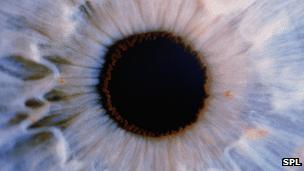Human stem cells 'help blind rats'
- Published

More than one in 10 people over the age of 75 have some form of glaucoma
Stem cells taken from the back of a human eye have restored some vision to blind rats, according to researchers.
They say the findings could help treat blindness, caused by glaucoma, if similar results can be repeated in humans.
The study, published in the journal Stem Cells Translational Medicine, used the cells to form new nerves in the eye.
These hooked up with the existing nerves, restoring sight.
Glaucoma can lead to blindness and is caused by a build-up of pressure within the eye. This kills retinal ganglion cells, the nerves which take information from the retina and pass it onto the brain.
Researchers at University College London and Moorfields Eye Hospital believe they have regenerated the retinal ganglion cells using human stem cells.
With permission from families, cell samples were taken from eyes which had been donated for cornea transplants.
Very rare cells in the eye, Muller glia stem cells, were collected. These were grown in the laboratory and converted into retinal ganglion cells.
These cells were then transplanted into the eyes of rats without retinal ganglion cells. Before the transplant the rats were blind. Afterwards, electrodes attached to the rats' heads showed that their brains were responding to low levels of light.
One of the researchers Dr Astrid Limb said the new cells were not joining up with the optic nerve as they would normally. Instead they appeared to be "bridging" with other nerves in the retina, which could pass the message on.
She said: "Although this research is still a long way from the clinic, it is a significant step towards our ultimate goal of finding a cure for glaucoma and other related conditions."
Prof Peng Khaw, the director of the National Institute for Health Research centre at Moorfields, said: "These results are very exciting.
"We see patients with glaucoma whose lives would be transformed with an improvement of only a small percentage of nerve cell function.
"The results of these experiments suggest that this may be possible in the future using cells we all have in our own eyes to achieve this."
The study was funded by the Medical Research Council. Its head of regenerative medicine, Dr Rob Buckle, said: "Repair of the eye is an area that is now at the forefront of this field, and this study highlights a new route for delivering the promise of regenerative medicine to treat disabling conditions such as glaucoma."
- Published22 September 2011
- Published6 February 2012
- Published24 January 2012